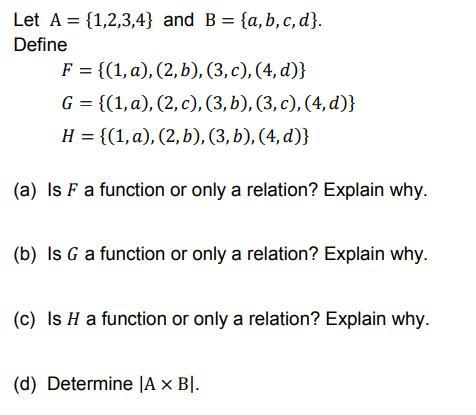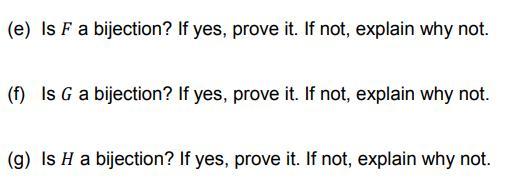Question
Let A = {1,2,3,4} and B = {a, b, c, d}. Define F = {(1, a), (2, b), (3, c), (4, d)} G =


Let A = {1,2,3,4} and B = {a, b, c, d}. Define F = {(1, a), (2, b), (3, c), (4, d)} G = {(1, a), (2, c), (3, b), (3, c), (4, d)} H = {(1,a), (2, b), (3, b), (4, d)} (a) Is Fa function or only a relation? Explain why. (b) Is G a function or only a relation? Explain why. (c) Is H a function or only a relation? Explain why. (d) Determine |A x B. (e) Is Fa bijection? If yes, prove it. If not, explain why not. (f) Is G a bijection? If yes, prove it. If not, explain why not. (g) Is H a bijection? If yes, prove it. If not, explain why not.
Step by Step Solution
3.44 Rating (167 Votes )
There are 3 Steps involved in it
Step: 1

Get Instant Access to Expert-Tailored Solutions
See step-by-step solutions with expert insights and AI powered tools for academic success
Step: 2

Step: 3

Ace Your Homework with AI
Get the answers you need in no time with our AI-driven, step-by-step assistance
Get StartedRecommended Textbook for
Discrete and Combinatorial Mathematics An Applied Introduction
Authors: Ralph P. Grimaldi
5th edition
201726343, 978-0201726343
Students also viewed these Mathematics questions
Question
Answered: 1 week ago
Question
Answered: 1 week ago
Question
Answered: 1 week ago
Question
Answered: 1 week ago
Question
Answered: 1 week ago
Question
Answered: 1 week ago
Question
Answered: 1 week ago
Question
Answered: 1 week ago
Question
Answered: 1 week ago
Question
Answered: 1 week ago
Question
Answered: 1 week ago
Question
Answered: 1 week ago
Question
Answered: 1 week ago
Question
Answered: 1 week ago
Question
Answered: 1 week ago
Question
Answered: 1 week ago
Question
Answered: 1 week ago
Question
Answered: 1 week ago
Question
Answered: 1 week ago
Question
Answered: 1 week ago
Question
Answered: 1 week ago
Question
Answered: 1 week ago
Question
Answered: 1 week ago
View Answer in SolutionInn App



